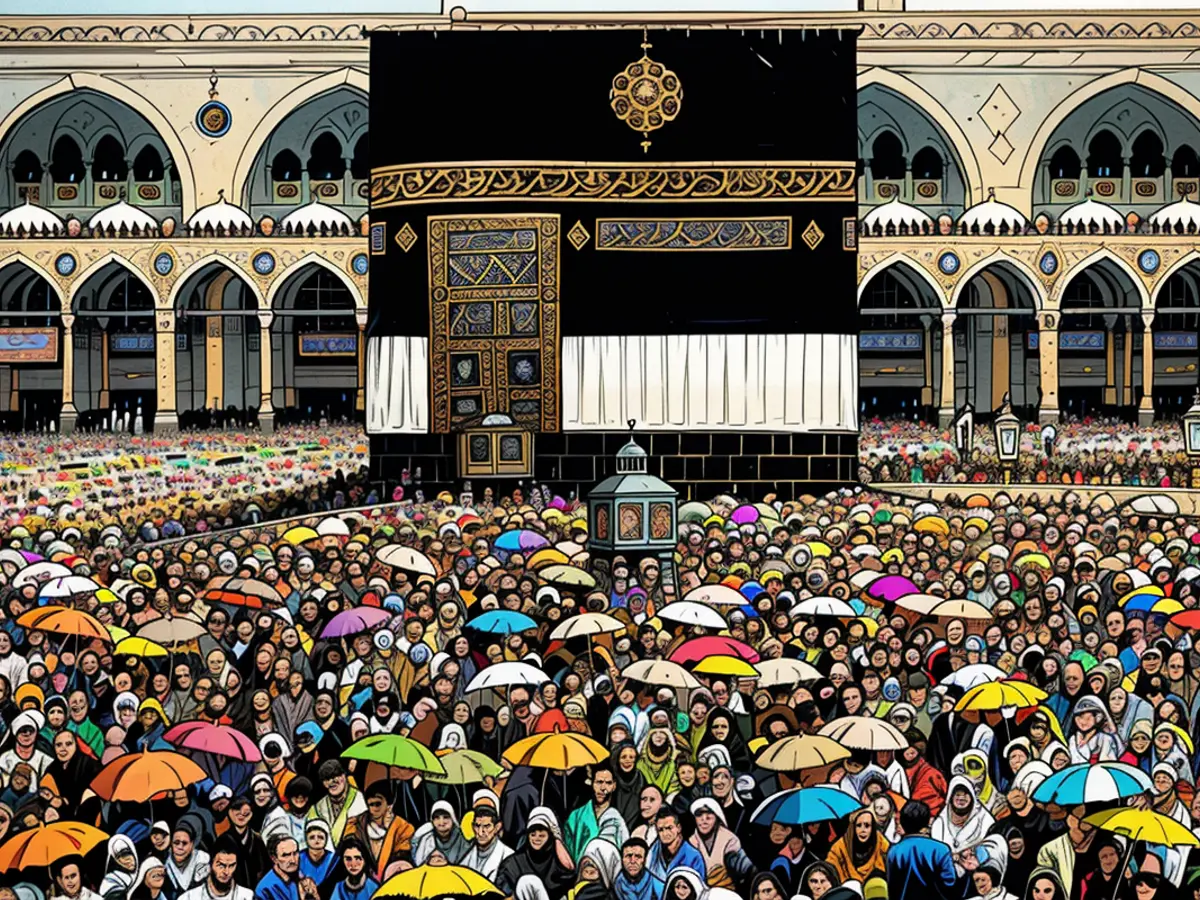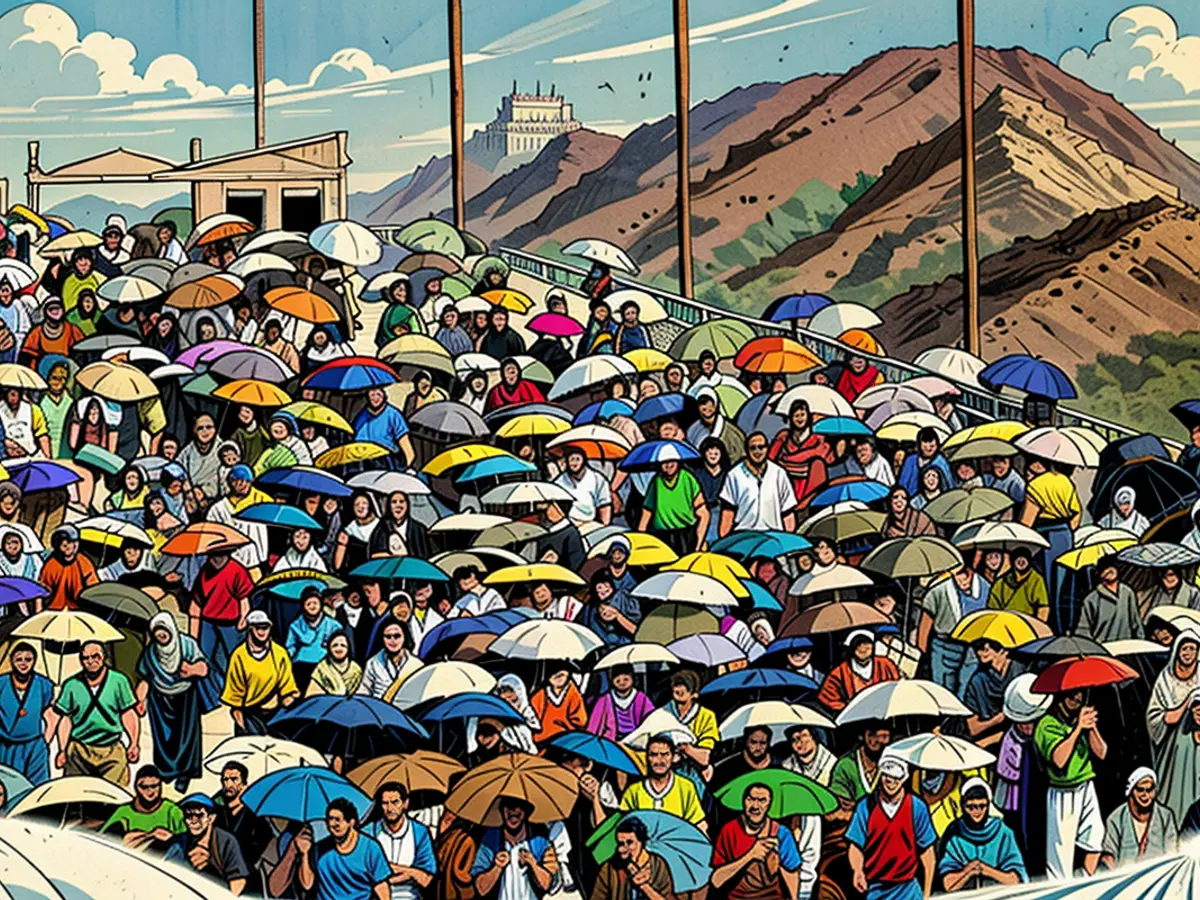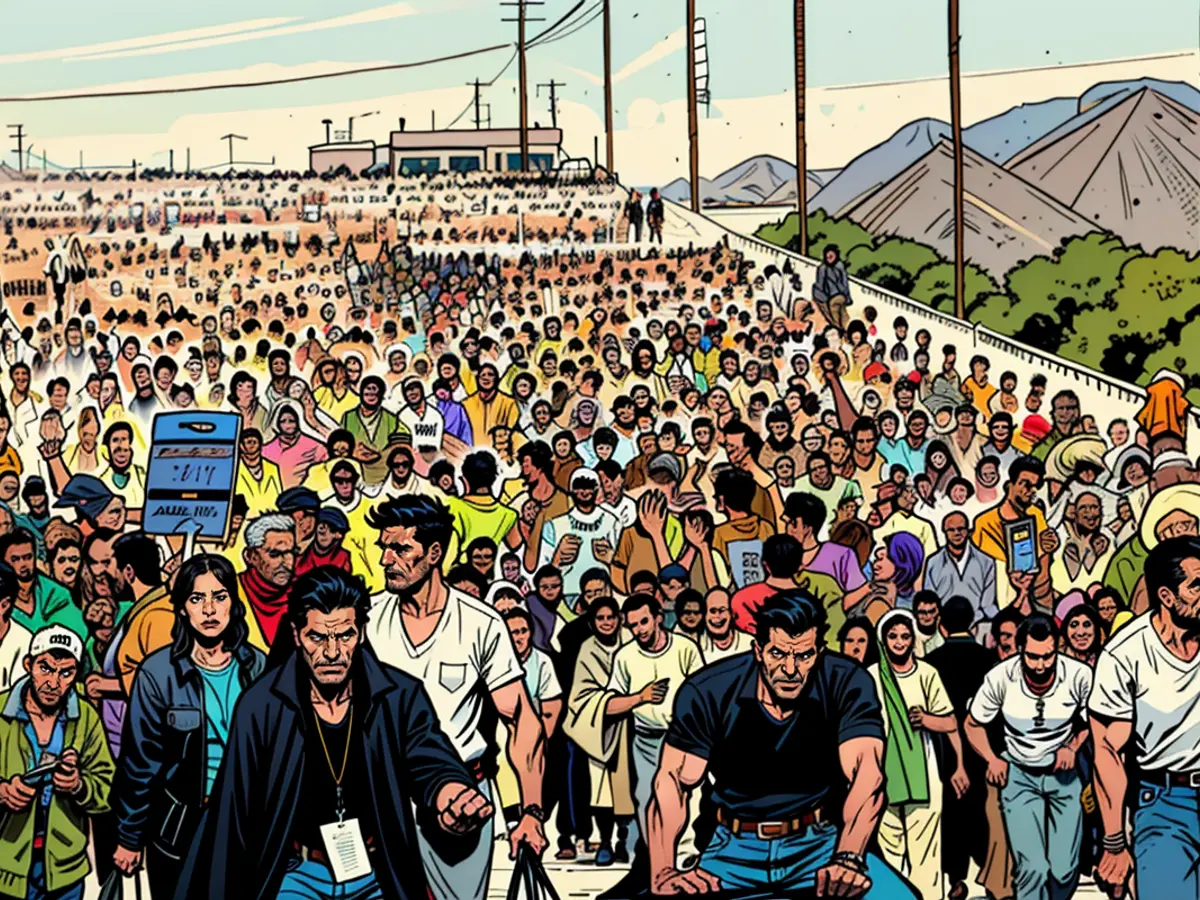Unauthorized Hajj Journey Represents Risk for Numerous Muslim Devotees
His final wish was unfulfilled, according to Mahmoud. Salem, his father, hadn't been able to perform the Hajj before due to financial constraints and upcoming marital expenses. To save money, he chose an unlicensed travel agency to organize his pilgrimage, which cost around 100,000 Egyptian pounds, a significant reduction from the official price of 150,000 Egyptian pounds.
Sadly, Salem never returned home. He was among the over 1,300 pilgrims who perished during this year's Hajj, as Saudi Arabia experienced record-breaking temperatures. Saudi authorities reported that the majority of the deceased were not authorized to perform the rituals.
The Hajj tragedy, resulting in one of the highest death tolls in years, has brought attention to the shady world of unauthorized pilgrimage agents. These agents exploit the religious fervor of Muslims by bypassing official procedures, often leading to perilous journeys.
Many of the deceased, according to Saudi authorities, "walked long distances under the scorching sun without appropriate shelter or comfort" as the temperature reached a staggering 125 degrees Fahrenheit (51.7 degrees Celsius).
For Salem, the journey to Mecca involved obtaining a personal visit visa instead of the necessary Hajj visa, which would have granted access to holy cities, facilities, and medical services. A visit visa, however, prohibits entry into Mecca, forcing pilgrims to take a desert path, often on foot.
Salem was traveling with his wife, who had been told a bus would transport their group. However, there was no transport to Mount Arafat and back, his son Mahmoud said. As a result, Salem and his wife had to walk the grueling 8 miles to Mina to complete the "stoning the devil" ritual.
Salem's wife grew exhausted during the journey, but he insisted on completing the rituals. He promised her he would return, Mahmoud shared. However, communication with Salem was lost after that. His wife spent five days searching for him before learning of his death at Al-Ma’aisam Hospital in Mecca.
"Our mother informed us of the news through a WhatsApp voice message," Mahmoud said. "The news was a devastating blow to us. Our mother is there, overcome with grief, and no one is there to comfort her."
A thriving black market
Each year, Saudi authorities issue a limited number of licenses allowing legal access to Mecca for pilgrims, along with air-conditioned transportation and accommodations. However, the cost of these licenses can be prohibitive for many, leaving them dependent on unauthorized travel agencies.
Unlicensed agencies frequently promise pilgrims an unofficial journey to Saudi Arabia, often assuring transport and accommodations that may not be provided or are of questionable quality. Combined with this year's extreme heat, this led to an unfortunate outcome for many pilgrims.
While deaths during the Hajj are not uncommon (there were over 200 last year), this year's gathering took place under unusually high temperatures. The Hajj season changes each year according to the Islamic calendar, and this year it fell in June, one of the hottest months in Saudi Arabia.

According to Atef Aglan, a member of the Egyptian Travel Agents Association, inexperienced tour operators and some mosque imams exploit a lack of awareness about Hajj procedures among many Egyptians. He believes the practice should be criminalized because "it has become a profession for those with no profession."
"This is premeditated murder because this broker knows that the temperatures are above 50 degrees Celsius (122 degrees Fahrenheit), and he knows that these people do not have decent accommodations," Aglan said.
A licensed Hajj package costs approximately $4,760, while an unauthorized trip costs around $3,700. The average annual household income in Egypt, as of 2019, is $1,429, according to the latest figures.
Inadequate care for pilgrims
The tragedy has also highlighted Saudi authorities' inability to prevent unauthorized pilgrimages or provide adequate care for those who undertake such journeys, which have been occurring for years.
It's uncertain how many unauthorized pilgrims participated in this year's Hajj, but Saudi news outlet Al Sharq Al Awsat reported Tuesday that 141,000 such pilgrims received free medical treatment during the Hajj season. That equates to approximately 8% of the 1.8 million pilgrims this year.
In the past couple of decades, the significant crowd size during Hajj has led to numerous tragedies during the pilgrimage, such as the stampede in 2015 that claimed over 700 lives.
Recognizing the monetary advantage of religious tourism, Saudi Arabia aims to boost Hajj pilgrim numbers to a staggering 5 million by 2030, currently just under 2 million.
However, some pilgrims have voiced their frustration over the poor management and facilities of the Hajj. Even those on authorized tours may find themselves spending most of their day outdoors, enduring scorching temperatures.
Hania Hassan Salama, a 65-year-old Egyptian housewife, explained her children's decision to create a mural of the Kaaba on their home's wall - a traditional practice in Egypt to announce a pilgrimage. Sadly, the day the mural was completed, her family lost contact with her. Relatives later confirmed her death, informing CNN that she had purchased an authorized Hajj package.
Her nephew, Mustafa Mohammed, pointed fingers at the Saudi authorities, accusing them of negligence this year, particularly in terms of medical assistance. "People were dying in the streets, and there was no one to help them," he told CNN. He believed that even pilgrims who used non-designated visas did not deserve to be abandoned and left to die without medical care.

Two other travelers who recently completed the Hajj shared their concerns with CNN about the insufficient medical personnel and facilities to protect worshipers from the intense heat in Saudi Arabia. Even pilgrims who followed official channels voiced worry over the lack of water, shade, and medical support from authorities.
Some witnesses reported seeing pilgrims collapsing due to the heat and walking past corpses wrapped in white cloth.
A 44-year-old Indonesian man, Ahmad, recounted seeing numerous pilgrims succumb to heat-related issues. "Along the way home, I saw many pilgrims who had passed away," Ahmad shared. "Every few hundred meters, there was a body lying and covered with an ihrom (white fabric) cloth."
CNN reached out to Saudi authorities regarding the inadequate heat response but has yet to receive a response.
Cracking down on unauthorized pilgrimages
Before the 2023 Hajj season, Saudi authorities cautioned pilgrims against using unauthorized Hajj tour operators and made efforts to address the issue by working with foreign governments and arresting some unlawful agents. They also threatened penalties for individuals assisting unauthorized pilgrims.
In the lead-up to this year's pilgrimage, Director of Public Security and Head of the Hajj Security Committee, Lieutenant General Muhammad bin Abdullah Al-Bassami, discussed measures to combat unauthorized pilgrims in a televised address, stressing that pilgrim safety was a priority. Local media reported that more than 300,000 individuals were barred from performing the rites as a result.
After the tragedy, Egyptian authorities seem to be intensifying their efforts against unauthorized agencies. The government has revoked the licenses of 16 Hajj tourism companies implicated in organizing unauthorized pilgrimages to Mecca and referred their managers to the public prosecutor.
Salem, the 81-year-old Egyptian who died during the Hajj, was buried in the Al-Baqi cemetery in Medina, Saudi Arabia, in accordance with an Islamic tradition that a pilgrim is buried in the holy land if they die during the pilgrimage. His wife plans to return to Cairo this Friday after completing the rituals.
Until she returns, Mahmoud explained that the family is making numerous attempts to contact her, offering comfort and encouragement, and urging her to prioritize her own well-being because she is alone there.
CNN's Abbas Al Lawati and Nadeen Ebrahim contributed to this report.

Read also:
Despite efforts to prevent unauthorized pilgrimages, many Muslims from the Middle East still choose to use unlicensed travel agencies due to financial constraints. This year's Hajj tragedy, which occurred under record-breaking temperatures, mainly involved pilgrims who had bypassed official procedures, highlighting the risks they take.
The worldwide black market for unauthorized Hajj journeys has exploited the religious fervor of Muslims for years, resulting in numerous tragedies and deaths, including Salem from Egypt, who perished during this year's pilgrimage.







